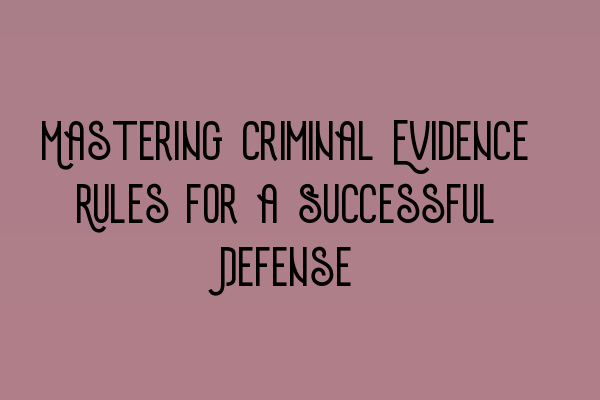Mastering Criminal Evidence Rules for a Successful Defense
Welcome to SQE Criminal Law & Practice Law UK! As solicitors, it is crucial to have a solid understanding of criminal evidence rules to effectively defend our clients. In this blog post, we will explore key strategies and techniques to help you master criminal evidence rules and achieve success in your defense cases.
Understanding the Importance of Criminal Evidence Rules
Knowing and applying criminal evidence rules is pivotal in building a strong defense. These rules govern the admissibility and exclusion of evidence in criminal proceedings, ensuring fairness and justice. By understanding these rules, you can protect your client’s rights, challenge the prosecution’s evidence, and construct a compelling defense strategy.
When preparing a defense, it is essential to evaluate the evidence against your client and identify any potential weaknesses or inconsistencies. This critical analysis will allow you to highlight flaws in the prosecution’s case and craft effective arguments. Remember, every piece of evidence must meet specific criteria to be admissible in court.
Key Criminal Evidence Rules Every Solicitor Must Know
1. Relevance: The evidence presented must be relevant to the case and must contribute to proving or disproving a fact in contention. Irrelevant evidence should be challenged and excluded.
2. Hearsay: Hearsay evidence, which is an out-of-court statement presented to prove the truth of the matter asserted, is generally not admissible. However, there are exceptions to this rule, such as statements made by a person who is unavailable to testify.
3. Character Evidence: Evidence of a person’s character or disposition is generally inadmissible to prove their conduct. Understanding when character evidence is admissible can make a significant impact on your defense strategy.
Utilizing Expert Witnesses and Cross-Examination
Expert witnesses play a vital role in criminal cases, providing specialized knowledge and opinions to the court. When presenting expert evidence, ensure that the witness is qualified and their testimony is relevant and reliable. Expert evidence can help challenge the prosecution’s case and provide alternative interpretations or explanations.
Cross-examination is a powerful tool for undermining the prosecution’s evidence and challenging witness credibility. By masterfully questioning witnesses, you can expose inconsistencies, biases, or hidden motives, making a compelling case for your client’s innocence.
Preparing for the SQE Criminal Law & Practice Examination
If you are preparing for the SQE Criminal Law & Practice examination, our SQE 1 Practice Exam Questions and SQE 1 Practice Mocks FLK1 FLK2 articles will be valuable resources. These mock exams and quizzes will help you assess your knowledge and identify areas for improvement.
For comprehensive preparation, consider enrolling in our SQE 2 Preparation Courses or SQE 1 Preparation Courses. These courses are designed to equip you with the necessary knowledge and skills to excel in the examination and in your future practice.
Stay updated with the latest SRA SQE Exam Dates to ensure you plan your preparation effectively and meet all the requirements.
Conclusion
Mastering criminal evidence rules is essential for solicitors to effectively defend their clients. By understanding the importance of these rules, knowing key principles, utilizing expert witnesses, and leveraging cross-examination techniques, you can build a successful defense strategy.
Visit SQE Criminal Law & Practice Law UK for more insights and resources to enhance your legal expertise. Remember, continuous learning and staying updated with changes in criminal evidence rules are critical for a successful legal practice.
